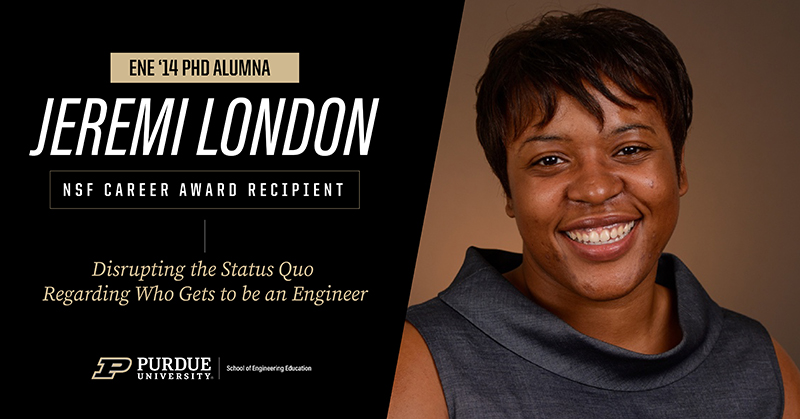Prof. Jeremi London, ENE '14 PhD Alumna, receives NSF CAREER award
| Event Date: | February 9, 2021 |
|---|
Dr. London's research project is titled "Disrupting the Status Quo Regarding Who Gets to be an Engineer" and means just that. "There are schools that are consistently among the top producers of Black and brown engineers. They’ve figured out something the rest of us have not. I want to figure out “the secret sauce” and share it with others," said London.
As an alumna of our program, Dr. London graduated from our program in 2014 and is an Assistant Professor in the Department of Engineering Education at Virginia Tech.
"Some people know me for my work on impact. Others know me for my work on diversity. This project combines both interest. I’m focused on Colleges of Engineering that are having the impact on diversity, equity, and inclusion that we want," continued London. We look forward to sharing the impact from her CAREER award and so proud of her work already accomplished. Congratulations, Jeremi!
Project Abstract
While there has been extensive research on the barriers Black and brown students face as they strive to participate in engineering education and the workforce, there is less scholarship on solutions for addressing this complex challenge. One reason for this is because the scholarship on how change happens in engineering education tends to focus on course content and classroom instruction. Unfortunately, such findings do not easily lend themselves to value-laden, systemic issues like diversity, equity, and inclusion (DEI). Fortunately, some Colleges of Engineering (COEs) throughout the U.S. have adopted change strategies that have resulted in consistently being named among the top-ten producers of Black and brown engineers. This project is motivated by a desire to learn from and follow their example.
This CAREER project will disrupt the status quo regarding who gets to be an engineer by investigating five COEs that have significantly changed the face of engineering over the last 20 years. This project will: (1) Advance our understanding of the change strategies that exemplary COEs have used to improve Black and brown students? access to engineering education and careers; (2) Identify evidence-based models for broadening participation of underrepresented racial/ethnic groups in engineering; and (3) Set COEs on a path to parity, such that the student body demographics in COEs across the country reflect the racial/ethnic makeup of the nation.
Using Kotter's Leading Change Model and Acker's Inequality Regimes as a framework, this multi-case study will investigate how exemplary COEs envisioned, implemented, and institutionalized changes that influenced Black and brown students' access to engineering. The five COEs that will be investigated are: Florida International University, Morgan State University, University of Central Florida, University of Maryland-Baltimore County, and University of Maryland-College Park. Given variations in the types of universities included in the research design, comparing and contrasting insights that emerge from each case will enable the PI to understand the conditions for change.
The use of a research study design that relies on both qualitative and quantitative data will produce complementary forms of evidence on what promotes and impedes progress in this context. The research outcomes will include: (1) impact narratives that document concrete examples of how to expand who gets to be an engineer; and (2) a model for broadening participation informed by a cross-case analysis of these exemplars. Furthermore, this timely work focuses on the need to leverage talent from every demographic to diversify the engineering workforce and improve the lived experiences of minoritized groups.
The educational outcomes will include: an Impact Playbook that translates the research into actionable strategies; a graduate course for future engineering faculty designed around each of the cases; a town hall discussion among associate professors; sharing insights with ASEE's Engineering Deans Council; and a partnership with Virginia Tech's (VT) College of Engineering and College of Science to build capacity among its leaders to envision and enact sustainable changes that promote DEI on VT's campus. This CAREER project has the potential to reshape how COEs approach their DEI efforts, and increase the likelihood of long-term success. The proposed activities are designed to foster a network of STEM leaders motivated to envision and enact sustainable, scalable changes that expand who gets to be an engineer at their institution.

